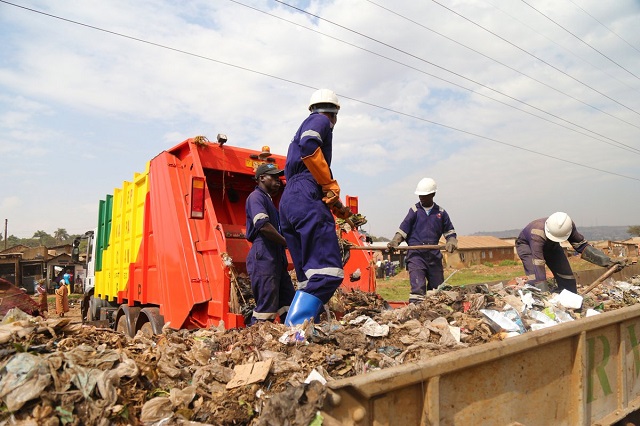Solid waste management is a global concern that affects the health and well-being of communities around the world. In Uganda, the issue of poor solid waste management is particularly pronounced, with serious implications for water quality and public health. Inadequate systems for waste collection, segregation, and disposal in many Ugandan communities have resulted in the contamination of water sources with solid waste leachate, rendering the water unsafe for consumption.
Uganda, like many developing countries, faces significant challenges in managing solid waste effectively. Limited infrastructure, inadequate waste collection services, and insufficient funding have contributed to the proliferation of open dumps, illegal waste disposal, and contamination of water bodies. As a result, the general state of solid waste management in many Ugandan communities is substandard, with adverse effects on both the environment and public health.
The contamination of water sources with solid waste leachate poses a grave threat to water quality. Leachate is the liquid that percolates through decomposing waste, carrying with it a cocktail of contaminants such as pathogens, heavy metals, and organic pollutants. When solid waste is not properly contained or disposed of, leachate finds its way into the water system, compromising the quality of water intended for human consumption.
The consequences of consuming water contaminated with solid waste leachate are dire. Communities that rely on contaminated water sources are at an increased risk of contracting waterborne diseases and infections. Diseases like cholera, typhoid fever, and hepatitis A thrive in unclean water, causing severe gastrointestinal illnesses and potentially leading to fatalities, especially among vulnerable populations such as children and the elderly.
Furthermore, the ingestion of toxins present in leachate can have long-term health effects. Heavy metals, for instance, can accumulate in the body over time, causing organ damage and impairing neurological development, particularly in children. The continuous consumption of dirty water perpetuates a cycle of illness, hindering social and economic development in affected communities.
Addressing the issue of poor solid waste management and its impact on water quality requires urgent intervention and concerted efforts from various stakeholders. It is imperative to invest in improving waste management infrastructure, including waste collection systems, landfill construction, and wastewater treatment plants. Adequate funding is essential to support these infrastructure projects and ensure the proper containment and treatment of solid waste, thus preventing the release of leachate into water bodies.
In addition to infrastructure improvements, public awareness and education campaigns play a vital role in changing attitudes and behaviours towards waste disposal. By promoting waste segregation, recycling, and responsible consumption, communities can reduce the volume of solid waste generated and minimize its impact on water sources. This requires engaging community members and empowering them to take ownership of their environment and actively participate in waste management initiatives.
Strengthening regulatory frameworks and enforcing compliance with proper waste management practices are crucial steps in combating the issue. Governments should develop and implement stringent regulations and policies while imposing penalties for non-compliance. This not only ensures that waste management practices are in line with environmental standards but also creates a sense of accountability among waste generators and handlers.
Moreover, investing in research and innovation is necessary to find sustainable solutions to the solid waste management problem. Exploring waste-to-energy systems, decentralized waste treatment options, and other innovative approaches can contribute to more efficient and environmentally friendly waste management practices.
However, all these efforts require substantial funding to be successful. The government, in collaboration with international organizations and private sector entities, must prioritize the allocation of adequate financial resources to address the solid waste management crisis. Funding is essential to support infrastructure development, education campaigns, regulatory enforcement, and research and innovation in waste management technologies.
Therefore, the poor solid waste management practices prevalent in Ugandan communities have dire consequences for water quality and public health. The consumption of contaminated water, contaminated with solid waste leachate, leads to the spread of infectious diseases and long-term health issues. Urgent interventions, including infrastructure improvements, public awareness campaigns, regulatory frameworks, community engagement, and research and innovation, are needed to address this issue effectively.
Adequate funding is crucial to ensure the successful management of solid waste, protect water sources, and safeguard the health and well-being of Ugandan communities. Only through collective action and commitment can we create a cleaner and healthier environment for all.
Do you have a story or an opinion to share? Email us on: dailyexpressug@gmail.com Or follow the Daily Express on X Platform or WhatsApp for the latest updates.

